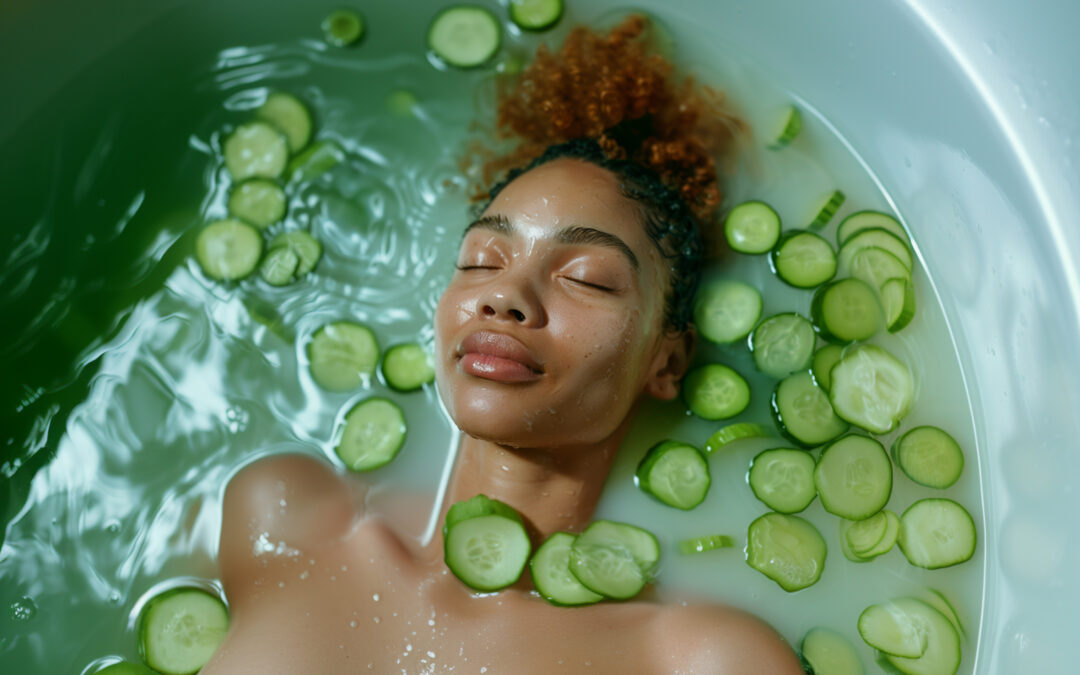Bathing Therapy: Healing Waters for Every Stage of Life
Water has always been more than just a source of life—it has been a source of healing. From the Roman baths to Japanese onsen and African herbal bath traditions, cultures worldwide have used bathing therapy (also known as balneotherapy or hydrotherapy) to restore balance in body and mind. Today, research confirms that the practice can benefit people across all ages and sexes, supporting not only general wellness but also specific life transitions such as menopause and male hormonal health.
What Is Bathing Therapy?
Bathing therapy is the use of water—sometimes enriched with minerals, herbs, or temperature variation—for therapeutic benefits. It may include:
-
Mineral baths – naturally rich in magnesium, sulfur, and calcium, known to support skin and joint health.
-
Herbal baths – infused with calming or healing herbs like chamomile, lavender, neem, or rosemary.
-
Temperature therapy – hot baths relax muscles and circulation, while cold immersion reduces inflammation and aids recovery.
-
Aromatic baths – with essential oils for relaxation and mood balance.
Wellness Benefits Across Ages & Sexes
Children & Young Adults
-
Stress relief & sleep – Warm baths infused with lavender or chamomile help calm the nervous system.
-
Research: A 2019 review in Sleep Medicine Reviews found that warm baths before bedtime improved sleep quality and reduced time to fall asleep (Haghayegh et al., 2019).
-
-
Skin support – Herbal or mineral baths can soothe eczema and acne-prone skin.
-
Research: Sulfur-rich balneotherapy has shown positive effects on chronic skin conditions like psoriasis and eczema (Dermatologic Therapy, 2018).
-
-
Muscle recovery – Hydrotherapy helps after sports or physical activity.
-
Research: A 2015 study in the Journal of Strength and Conditioning Research showed that contrast baths aided muscle recovery and reduced soreness in young athletes.
-
Adults
-
Stress and anxiety reduction – Warm baths lower cortisol levels, supporting mental health and resilience.
-
Research: A study in Evidence-Based Complementary and Alternative Medicine (2018) reported that regular warm bathing reduced stress and enhanced overall well-being (Kamioka et al., 2018).
-
-
Joint & muscle ease – Helpful for people with arthritis, back pain, or physically demanding jobs.
-
Research: A 2015 meta-analysis in Clinical Rheumatology confirmed that balneotherapy reduces pain and improves function in osteoarthritis patients.
-
-
Immune function – Contrast baths (alternating hot and cold) stimulate circulation and immune response.
-
Research: Hydrotherapy was found to improve circulation and stimulate immune activity in a study published in Medical Hypotheses (2014).
-
Women in Perimenopause & Menopause
Hormonal shifts during menopause often bring challenges such as hot flashes, sleep disturbance, and joint stiffness. Bathing therapy offers gentle, supportive relief:
-
Relaxation & sleep – Evening warm baths help regulate body temperature and improve sleep quality.
-
Research: According to Sleep Medicine Reviews (2019), passive body heating through warm baths improved sleep onset and quality in women experiencing insomnia symptoms.
-
-
Joint & muscle relief – Mineral-rich baths may ease stiffness and muscle tension.
-
Research: Studies in International Journal of Biometeorology (2017) showed balneotherapy improved mobility and reduced joint pain in postmenopausal women with osteoarthritis.
-
-
Mood balance – Aromatic baths with lavender or clary sage essential oil support emotional well-being.
-
Research: A 2016 trial in Journal of Alternative and Complementary Medicine found lavender aromatherapy baths significantly reduced menopausal anxiety and stress levels.
-
-
Skin support – Hydration and circulation benefits improve skin elasticity, countering dryness common in menopause.
-
Research: Research in Dermatology Reports (2019) found that thermal mineral baths improved hydration and elasticity in aging skin.
-
Men’s Health
Men also benefit from bathing therapy, particularly as testosterone levels gradually decline with age:
-
Stress recovery – Warm baths lower stress hormones that can negatively impact testosterone balance.
-
Research: A 2017 review in Frontiers in Physiology linked stress reduction through hydrotherapy with healthier endocrine (hormonal) balance.
-
-
Muscle & performance recovery – Cold baths support quicker recovery after workouts.
-
Research: A 2015 study in Journal of Physiology found that cold water immersion accelerated recovery after resistance training.
-
-
Cardiovascular health – Hydrotherapy supports circulation and heart function.
-
Research: A 2016 study in American Journal of Physiology showed that regular hot baths improved vascular function and lowered blood pressure in men.
-
-
Mental well-being – Relaxing baths help manage midlife stress, which often impacts sleep and energy levels.
-
Research: A study in BMC Complementary Medicine and Therapies (2018) showed warm bathing improved psychological well-being and reduced depression symptoms in adults.
-
Final Thoughts
Bathing therapy is not just about hygiene—it’s about healing, restoration, and balance. Whether you are a teenager battling stress, an athlete in recovery, a woman transitioning through menopause, or a man managing midlife changes, bathing therapy offers a natural, time-tested way to support wellness.
At Vitalis Origin, we believe in reviving ancient practices that nurture hormonal health, vitality, and overall balance—and bathing therapy is one of the simplest yet most profound ways to care for your body and mind.
Disclaimer: Bathing therapy is complementary and should not replace medical treatment. People with cardiovascular issues, severe skin conditions, or pregnancy should seek medical advice before starting intensive hydrotherapy.

